#Environment/Ecofeminism
Explore tagged Tumblr posts
Text
SPREAD THE WORD / WHERE IS JULIA CHUÑIL?🇨🇱
THIS IS JULIA CHUÑIL, INDIGENOUS DEFENDER OF THE MAPUCHE PEOPLE'S RIGHTS AND PROTECTOR OF THE NATIVE FORESTS FROM CHILE AND ALL AROUND THE WORLD
SHE WAS LAST SEEN WITH HER DOG ON NOVEMBER 8TH, 2024, IN MAFIL, A RURAL TOWN.
HER ACTS ON DEFENDING NATIVE FORESTS FROM BIG COMPANIES THAT WANT TO EXPLOIT AND DESTROY ANCESTRAL TERRITORIES MADE HER RECIEVE THREATS BY THOSE COMPANIES AND OTHER POWERFUL PEOPLE LIKE JUAN CARLOS MORSTADT ANWANDTER, SHE WAS HARASSED AND ATTACKED MULTIPLE TIMES. SHE TOLD HER RELATIVES "IF SOMETHING HAPPENS TO ME, IT'S HIS FAULT (refering to Juan Carlos)"
PLEASE RESEARCH ABOUT HER AND SPREAD THE WORD ALL AROUND THE GLOBE, EVERYONE MUST KNOW THAT ENVIRONMENTAL ACTIVISTS ARE BEING DISSAPPEARED IN CHILE

#environment#ambientalismo#communism#marxism#socialism#anti imperialism#ecology#ecofeminism#eco terrorism#indigenous#chile#mapuche#spread#radfemblr#radical feminism#marxist feminism#feminism#radical feminist safe
115 notes
·
View notes
Text

Chap 12. Melancholy Natures, Queer Ecologies by Catriona Mortimer-Sandilands (part 3, final)
Queer Ecologies
‘what it might mean to inhabit the natural world having been transformed by the experience of its loss’?
‘[the queer artist's] natures are not saved wildernesses; they are wrecks, barrens, cutovers, nuclear power plants: unlikely refuges and impossible gardens. But they are also sites for extraordinary reflection on life, beauty, and community’ (344)
AIDS and Other Clear-Cuts
The artist (Jan Zita Grover’s North Enough) writes about moving from San Francisco, where she has worked as a personal caregiver to many individuals who were dying, and died of, AIDS, eventually to the woods of Northern Wisconsin and Minnesota hoping for ‘a geographic cure’ to her burnout and grief. (344)
‘in their persistence [grief, mourning], generate a form of imagination—an awareness of the persistence of loss—that allows her to conceive of the natural world around her in ways that challenge the logic of commodity substitution characterizing contemporary relations of nature consumption” (344)
“The north woods did not provide me with a geographic cure. But they did something much finer. Instead of ready-made solutions, they offered me an unanticipated challenge, a spiritual discipline: to appreciate them, I needed to learn how to see their scars, defacement, and artificiality and then beyond those to their strengths—their historicity, the difficult beauties that underlay their deformity. AIDS, I believe, prepared me to perform these imaginative feats. In learning to know and love the north woods, not as they are fancied but as they are, I discovered the lessons that AIDS had taught me and became grateful for them” (344)
Rather than the landscape of her dreams, the land looks more like a candidate for reclamation. Through Grover’s research we learn that the region is one that been ‘systematically abused: logged several times, drained, subjected to failed attempts at agriculture, depleted, abandoned, eroded, invaded, neglected.”
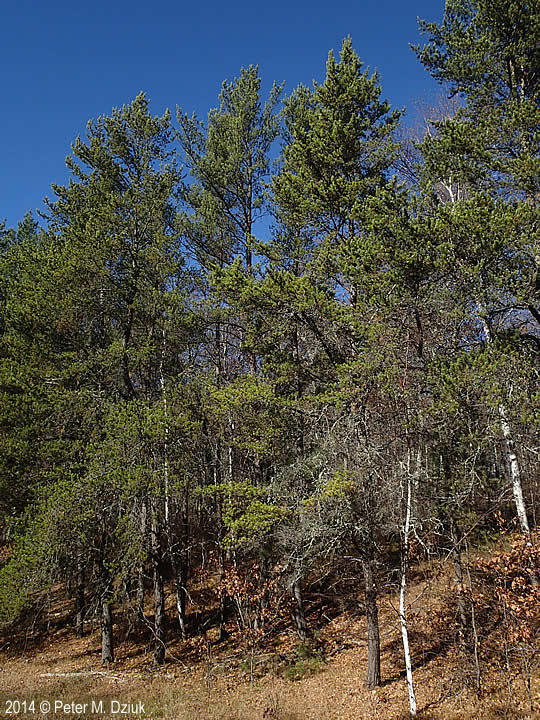
Jack pines are predominant in the region; tenacious, ‘the first conifers to reestablish themselves after a fire” (16), in their own way remarkable even as they are useless for lumber, short lived, and not at all the sorts of trees about which adjectives like ‘breathtaking’ circulate” (345) they are a loud testament to the violence that has generated them.
“the diminishment of this landscape mortified and disciplined me. Its scars will outlast me, bearing witness for decades beyond my death to the damage done here” (20) But still: the love emerges, painfully, gradually, intimately. (345)
She experiences the landscape in terms of loss and change, rather than idyll and replacement. It is all personal; it is all about developing a way of making meaning that recognizes the singularities of the past and takes responsibility for the future in the midst of intimate devastation. (345)
‘Environmental hubris’—fly fishing, the introduction of non-native fish to the river, changing temperatures of rivers caused by logging and diversion; specific policies, politics, and technologies that have had effects on the rivers, the fish, and the other species throughout the river and the north woods (356)
A refusal to demonize the ‘invasive’ species; Grover herself is ‘invasive’ both culturally and personally (white settlers and big city imports) thus her ethical claim is not for purity but for an active and thoughtful remembering of historical violences in the midst of ongoing necessity of movement and change (346)
Seek relationships with Clear-cuts and landfills in order to bring to the foreground the massive weight of human devastation of the natural world; “a discerning eye can see how unstewarded most of this land has been. The charm lies in finding ways to love with such loss and pull from it what beauties remain” (81) (347)
“she does not romanticize the dying even as she might mourn their loss to the world; instead [through Grover] we witness each loss as particular, irrevocable, and concrete: she is their witness” (347)
Can we learn to see these landscapes as creation as well as destruction?
Rather than mourn the loss of the pristine, she carefully cultivates an attitude of appreciation of what lies before her, beyond the aesthetic wilderness to the intricate details of human interactions with the species and landscapes of the region. In this manner she comes to be able to find the beauty in, for example, landfills and clearcuts; far from naivete or technophilia, this ability is grounded in a commitment to recognizing the simultaneity of death and life in these landscapes, the glut of aspen-loving birds in the clear-cut, the swallows, turkey vultures, and bald eagles near the landfill.
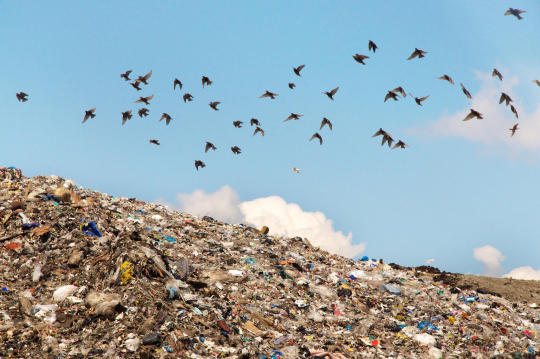
--
It is necessary to face our fear and pain; we have to make room in our relationships with the natural world, queer and otherwise, for the recognition that that is what we might be feeling in the first place (355)
#queer ecologies: sex nature politics desire#queer ecology#queer theory#ecofeminism#critical ecology#environmental politics#ecology#aids crisis#mourning nature#ecogrief#colonialism#environmental degradation#melancholia#queer politics#melancholy#environmentalism#climate and environment#environmental justice#forests
82 notes
·
View notes
Text

x
#badges#pins#feminist badges#eco feminism#ecofeminism#radfem safe#buttons#feminist pins#feminist buttons#protect the environment
78 notes
·
View notes
Text
Nature—a force beyond our petty reckoning, our selfish desires, our short-sightedness, our greed—will always take back what is rightfully hers
from "Where Must We Go, We Who Wander?"
#eden#nature#environment#ecocriticism#ecofeminism#words#essays#films#cinema#furiosa#quotes#writing#my writing#writers on tumblr#newsletter#substack
6 notes
·
View notes
Text
There's a lot of nuanced and thoughtful replies on both sides of this discussion, but I think this is what I agree with the most.
Admittedly, I am not vegan or vegetarian. I eat meat rarely, but I do eat it. One of my goals for 2025 is to transition most of the animal products I eat to be sourced locally from nearby farms. I want to be mindful of the fact that I'm eating a being that was once alive and conscious and had emotions, and I want to feel gratitude that I can eat and live because of it. This only feels just if the animal itself lived a good, humane, sustainable life before dying. If the animal was raised in a CAFO (Concentrated Animal Feeding Operation) where it could barely turn around and rarely saw the sun, then it would not be just. It would be an atrocity.
Additionally, many people in the reblogs are taking the position that taking on an environmentally conscious lifestyle (e.g. plant-based diet, reusable period products, etc) is somehow misogynistic. I understand the argument: if the vast majority of men are not doing these things, why should we waste our precious time, energy, and money doing them either? It's a good question, and a valid position that I would agree with—if the shadow of global warming was not darkening our door.
Radfems: do you remember how it felt to first learn radfem theory? To have your eyes opened to the reality of the world, much more horrible and oppressive and unfair than you were led to believe? To become a killjoy as you can no longer turn that part of your brain off?
That's how it is as an ecofeminist, but with a far more urgent threat of existential doom. Once you start paying attention to the environment, your eyes are once more opened to the reality of the world, much more horrible and oppressive and unfair than you were led to believe.
For example, the top ten hottest years on record were the last ten years (2014-2024). Climate scientists have long said that we must keep the global temperature below 1.5°C or "well below" 2°C above pre-industrial temperatures. This is the point at which the risk of catastrophic and irreversible changes to the planet increases significantly. It's a long-term domino effect, meaning that what we do today locks in what we experience in our future. In short: as the planet warms, the ice sheets melt, which disturbs global atmospheric and oceanic trends, amplifying extreme weather events such as flooding and wildfires, ultimately causing millions of people to die or be displaced from their homes. Famine will likely ensue as systems of agriculture, farming, and fishing are severely disrupted. The severe rate of biodiversity loss and species extinction we are already experiencing will only continue.
2024 was the first year on record to have a global temperature above 1.5°C.

Figure 1: Annual global mean temperature anomalies from January – September 2024 (relative to the 1850-1900 average) from six international datasets.
The message is clear: if we want to avoid the most catastrophic changes, we must act NOW.
So: what the fuck do we do??
The painfully obvious answer is to get our governments to actually give a shit. If the world leaders banded together and decided to care about people over profits for once, then we might actually see a significant change in the climate.
But that's not happening. Especially not with Trump in office. Especially not as bombs keep exploding in Gaza and Ukraine. No.
So what the fuck do we do??
We look at the data, and see what we can do as individuals to make the most significant impact.
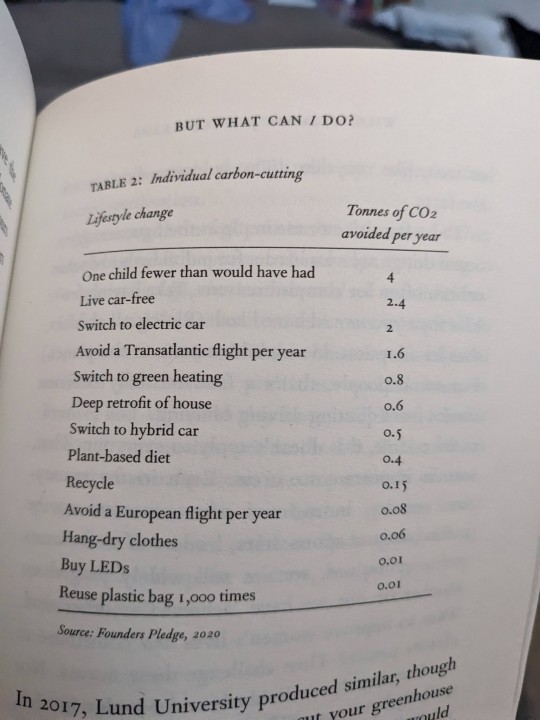
Figure 2: The most impactful individual carbon-cutting lifestyle changes.
Well, the top seven of these choices tend to be prohibitively expensive and sometimes out of our control. In contrast, switching to a plant-based diet (or even just reducing meat!) has an enormous individual impact per year.
Why is reducing meat consumption so impactful? Long story short, this is because our current, Western method of raising animals is an extremely environmentally harmful process. The amount of land and water we use to grow crops just for animals while people are starving is absurd. The animals themselves are in horrendous conditions like CAFOs that amplify carbon and methane emissions. It's not sustainable or just. Eating fish is no better, as most of the oceanic pollution comes from fishing lines, but that's a whole other topic.
In conclusion: I don't think anyone should be forced to change their diet, especially women. But I have no sympathy for people who complain about being guilt-tripped. We need to feel guilty in order to enact change. The Western way of life specifically has glorified convenience and individualism. These are not sustainable modes of thinking, and on a societal level they contribute directly to industries (fast fashion, etc) that accelerate global warming. It would be ideal if our world leaders actually made policies to combat the climate crisis so that we don't have to feel guilty, but if the people who are actually at fault are not going to step up, then someone has to.
Obviously everyone's circumstances are different, and some will not be able to afford or access more eco-friendly options. It is the job of governments, nonprofits, and concerned citizens to implement programs to help bridge those access and affordability gaps. But, come on. If you care and you are able and you can afford it, then why not make a lifestyle change that benefits the environment? Just being more environmentally conscious, at the risk of feeling guilty about your consumption, also opens up a way of thinking that connects you deeply to the world around you. Is it not more feminist to at least look at the world with open eyes?
References:
Figure 1: World Meteorological Organization. 2024. "2024 is on track to be hottest year on record as warming temporarily hits 1.5°C" https://wmo.int/news/media-centre/2024-track-be-hottest-year-record-warming-temporarily-hits-15degc
Figure 2: Cripps, Elizabeth. 2022. What Climate Justice Means and Why We Should Care. Bloomsbury Continuum.
Further Reading:
(Highly highly highly recommend!!) Keith, Lierre. 2015. "The Girls and the Grasses." https://dgrnewsservice.org/resistance-culture/radical-feminism/lierre-keith-the-girls-and-the-grasses/
Omolere, Mitota. 2024. "What 2C of Warming Will Look Like: A Comprehensive Assessment." https://earth.org/what-2c-of-warming-will-look-like-a-comprehensive-assessment/
McGuire, Bill. 2023. "The point of no return: how close is the world to irreversible climate change?" https://www.sgr.org.uk/resources/point-no-return-how-close-world-irreversible-climate-change
Why is it a controversial take to say women shouldn't prioritise a chicken's life over their own? Veganism is not feminist, full stop. I get it, I feel bad for the animals too, but the world isn't all sunshine and rainbows, and as omnivores humans need animal products to be strong and not malnourished. Women are raised to be overly empathetic to anything other than themselves. You can't buy into this self-destruction, be on an EXTREMELY restrictive diet, and call yourself a radical feminist. I thought we were fighting diet culture here.
I will go to the gym and eat a steak for every woman that diets herself into being tiny and weak and skinny, don't @ me. A female human being is not a fucking squirrel. Be in a misogynistic cult if you want to, but don't shame other women for not joining it.
#vegan#veganism#radical feminist#radfems please touch#rad fem#radical feminism#rad leaning#global warming#environment#environmentalism#vegetarian#vegetarianism#ecofeminist#ecofeminism
690 notes
·
View notes
Text
I always liked the subgenre of B-horror movies where animals suddenly start attacking people. Maybe otters are taking a tip from orcas? Either way - nature fights back.
#otters#animals#orca#fuck them yachts#anyway fuck capitalism#sordidamok!#environmetalists#environment#animal liberation#eco terrorism#ecofeminism#nature#nature finds a way#we have met the enemy and he is us
0 notes
Text







🌟 Introducing Tilo The Ultimate Microfiber Cleaning Cloth!
🌟 Hello! Are you tired of dealing with chemical-laden cleaners and disposable paper towels? Say goodbye to those hassles and say hello to the game-changer in cleaning: Tilo, the ultimate microfiber cleaning cloth! This innovative cloth, made in Japan, is your all-in-one solution for a sparkling clean home, car, and more. With Tilo, there's no need for chemicals – simply rinse in water, wring, and wipe away dirt, dust, and grease from any surface. It works like magic on stainless steel, windows, electronics, mirrors, glasses, tiles, granite, plastic, wood, and even your beloved car!
Here's why you'll love Tilo:
✨ Chemical-free cleaning: Just water is all you need! ✨ Lint-free, streak-free, and scratch-free results guaranteed. ✨ Save money on paper towels and chemicals – Tilo is reusable and durable. ✨ Made in Japan for superior quality and long-lasting performance. ✨ Machine washable and odor-free for hassle-free maintenance. ✨ An eco-friendly choice that cares for your home and the planet.
Experience the cleaning revolution with Tilo – the ultimate cleaning cloth that will transform your cleaning routine forever. Join the sustainable cleaning movement and embrace effortless, effective, and chemical-free cleaning with Tilo! Order yours today and discover a new level of cleanliness.
#microfiber#mirror#cleaning#ecofriendly#economy#ecosystem#sustainable#sustainability#environment#ecology#ecofeminism#climate#microfibertowel#carwash#microfibercloth#whitetowel#windowcleanintilo#tilomicrofibercloth#tilomicrofiber#theultimatecleaningcloth#lintfree#streakfree#scratchfree
0 notes
Text

‘Crocheted Environment (Womb Room)’ by Faith Wilding (1972) © Agostino Osio
Faith Wilding (born 1943) is a Paraguayan American multidisciplinary artist - which includes but is not limited to: watercolor, performance art, writing, crocheting, knitting, weaving, and digital art. She is also an author, educator, and activist widely known for her contribution to the progressive development of feminist art. She also fights for ecofeminism, genetics, cyberfeminism, and reproductive rights. Wilding is Professor Emerita of performance art at the School of the Art Institute of Chicago.via Wikipedia
#Faith Wilding#Womb Room#Paraguayan American#multidisciplinary artist#performance art#ecofeminism#cyberfeminism#Paraguayan#Paraguay
16 notes
·
View notes
Text
one of my favorite ecofeminism/black feminism reads is definitely The Green Belt Movement by Wangari Maathai, it's an inspiring story of encouraging people to help their country improve the environment with new ideas for the rest of the world to have hope in
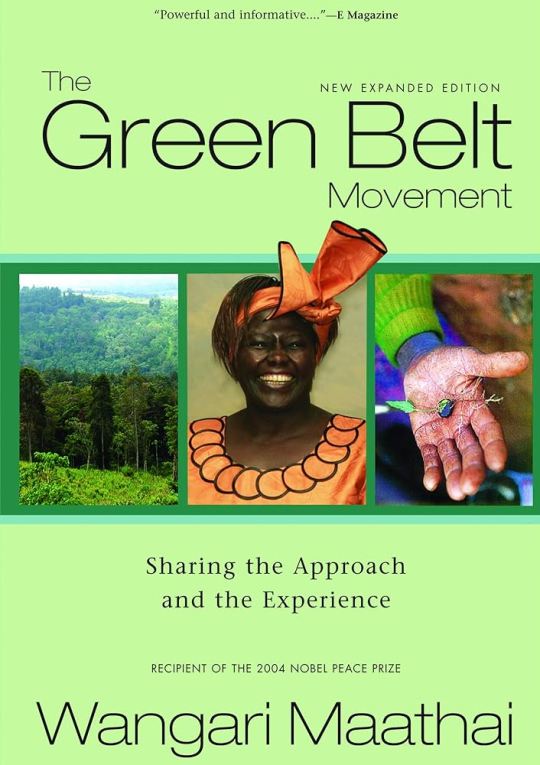
there's only one book left on Amazon but you can buy used ones there!
#ecofeminism#eco conscious#intersectional feminism#black feminism#womanism#feminism#ecology#ecosystem
24 notes
·
View notes
Text
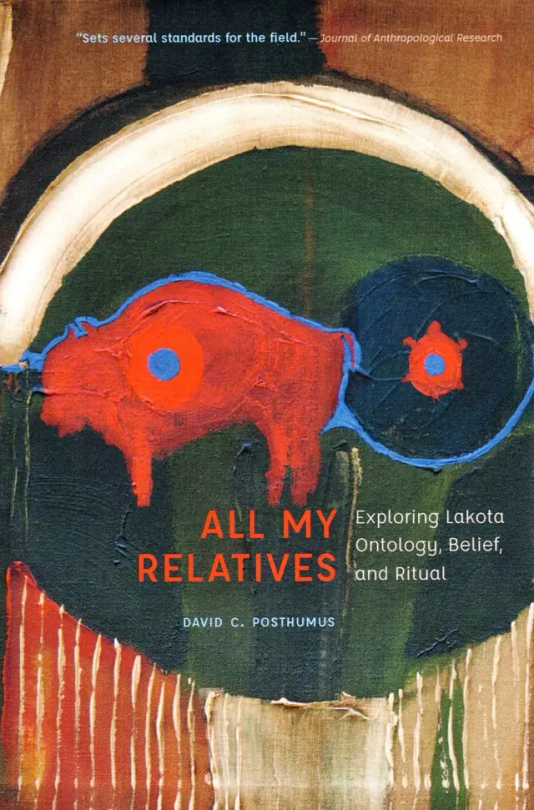

All my relatives: Exploring Lakota ontology, belief, and ritual. Posthumus DC (2022)
This is a book all about Lakota traditional beliefs and therefore has a lot of information connected to Mitakuye Oyasin. “At the heart of both Lakota religious continuity and innovation is an underlying animist ontological orientation, a basic way of seeing, understanding, and being in the world that extends personhood— in the form of a soul or spirit— to nonhuman life- forms.” This is expressed with ‘Mitakuye Oyasin’ –meaning ‘all my relatives’ or ‘we are all related’, which refers not only to human kinship but also to the relationship shared by all life-forms, both human and nonhuman, and the reciprocal obligations, responsibilities, and mutual respect that naturally extend from it” (14).
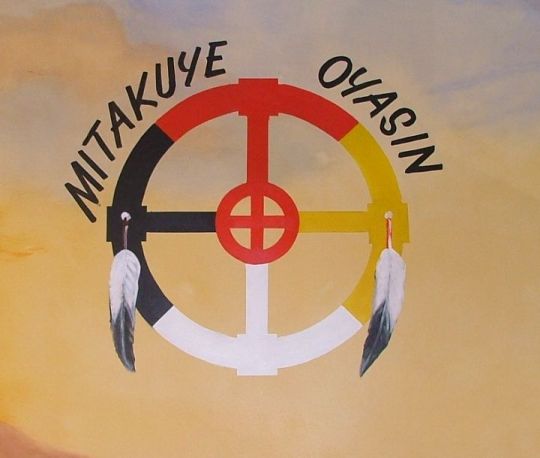
This repeats much of the ideas from similar definitions: belief in the connection between all life, relationships, the power the phrase has. It also gives a lot of words to help define these beliefs in academic language. Another important thing to point out is the way mitakuye oyasin is recognized as being part of Lakota innovation; my goal here is to use mitakuye oyasin to an innovation of queer ecology–hopefully add to the conversation.
“The normative cultural values encompassed by mitákuye oyásʾį are the very foundation of kinship, relational ontology, and the overarching interspecies collective, of which humans are only one hoop, one oyáte ‘people, nation, tribe’, in the company of many others. The key constituents of this animist ontology and worldview, of mitákuye oyásʾį, are persons, a category that extends beyond human beings to nonhuman or other- than- human persons. [...] Importantly, the Lakota worldview sees humans as the least knowledgeable and powerful beings, requiring the most aid and pity, upending the common Western biblical assumption that humans have dominion to rule over all other life- forms and subdue the earth (see V. Deloria 1999, 50; 2009, 99– 100). For the Lakotas, the seed of all life is wakʿą ‘sacrality, mystery, divinity’; ́ hence all life- forms share a generalized interiority, whether human or nonhuman.”
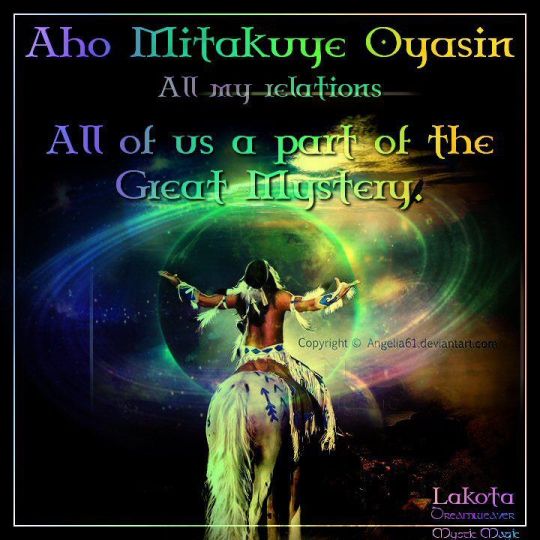
This is important information to support my argument. Queer ecology is very critical of Western beliefs and dichotomies that separate humans from nature and thereby present mankind as the ultimate lifeform (anthropocentrism). There are many essays and articles that examine the influence Christianity has had on the colonialist project (Gaard is the first that comes to mind). The Lakota worldview of being the ‘younger siblings’ of creation are supported by science in that ‘humans’ as a 'species' haven’t existed all that long in comparison to other 'species' and like many indigenous cultures, Lakota people knew the key to knowing nature was to learn from the world around us, as the author later confirms:
“Deloria explains that “the oldest traditions say that humans learned politeness and courtesy from the animals. . . . Generations of elders had already observed the behavior of birds . . . and decided that emulating them was the proper way for humans to act” (V. Deloria 2009, 123). Standing Bear (2006a, 56) substantiates this, writing, “The Lakota enjoyed his association with the animal world. For centuries he derived nothing but good from animal creatures. From them were learned lessons in industry, fidelity, and many virtues and much knowledge.” (50-51)
In the author’s footnotes is Vine Deloria’s examination of mitakuye oyasin that is, I feel, a great support of my claim:
“Vine Deloria refers to mitákuye oyásʾį as the ‘Indian principle of interpretation/observation,’ calling it “a practical methodological tool for investigating the natural world and drawing conclusions about it that can serve as guides for understanding nature and living comfortably within it. . . . We observe the natural world by looking for relationships between various things in it. . . . This concept is simply the relativity concept as applied to a universe that people experience as alive and not as dead or inert” (1999, 34). (Posthumus 2022 p219 f)
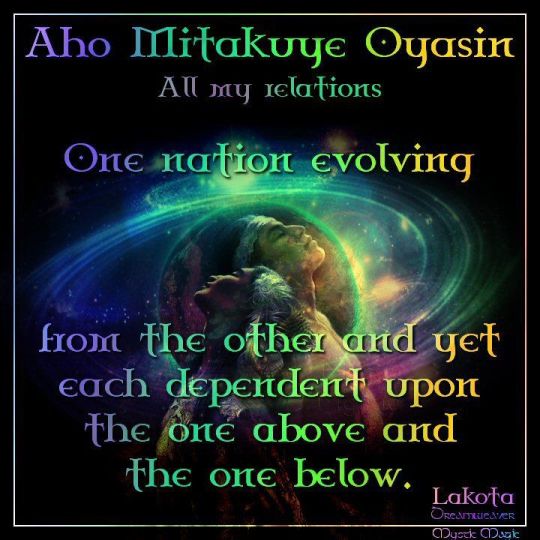
Queer ecology’s goal in many ways is to critique the ways the Western scientific paradigm has created inequity. Many are seemingly searching for solutions and answers to the problems that have been perpetuated by the colonial empire, supported as it is by western science.
While we must always, always be careful of appropriation and misappropriation–I contend that the solutions are not ones that need to be ‘discovered’ or solved in the way that Western science is so often searching for–advancement, the future…but rather, the answers are in what has always been there…and it’s simply a matter of observation.
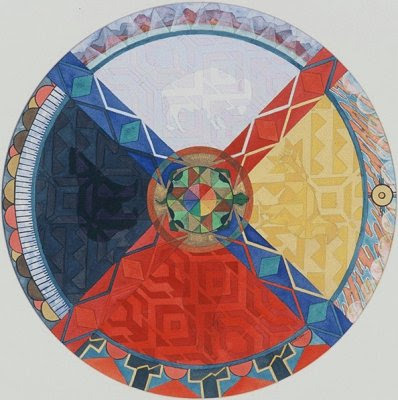
#queer ecology#mitakuye oyasin#queer theory#ecofeminism#critical ecology#colonialism#all my relatives#lakota#indigenous studies#postcolonial theory#ecology#science#traditional ecological knowledge#queering ecology#ecosystems#environment#social ecology#long post
25 notes
·
View notes
Text
What the fuck is ecofeminism?
Ecofeminism can be found everywhere and in everything. It is not isolated to an interdisciplinary subsect of environmental studies. It is not an outlandish term used to describe a far-left, hippie-dippy type of feminism. But, it is a lens from which to look at the world and explain the intersection of the subordination of certain populations to the global machine that is patriarchy. Ecofeminism is a political and intellectual movement, one that uses philosophical diagnoses to compare the subordination of women and nature. Women have always been brilliant thinkers, and the Earth has always been our home. Neither have received enough credit. Let’s give some credit to some of the many women in history who became pillars of the ecofeminist movement.
In 1974, Françoise d’Eaubonne published a book entitled Le Féminisme ou la Mort, or Feminism or Death, translated to English. D’Eaubonne was a French civil rights activist, environmentalist, and self-driven philosopher who coined the term ecofeminism. Her analysis concluded that the perpetrator of the exploitation of nature and the subordination of women is the same: patriarchy. D’Eaubonne was not an academic but developed the profound neologism from her observations and experience of activist work within French society. At the time of publication, she received very little support or praise for her work that would later go on to shape the environmental and feminist narratives of the zeitgeist. While France lagged, the term ecofeminism became broadly used, particularly in the United States in the late 1970s, as many environmental movements were headed by women and environmental destruction was becoming increasingly evident.
Twenty years after the publication of Feminism or Death, in 1994, Karen Warren published Ecological Feminism. Her work developed upon ideas for which D’Eaubonne had set the framework. Warren explains three oppressive conceptual frameworks of patriarchy and its contribution to environmental degradation and female subordination: value dualism, value hierarchy, and the logic of domination. Value dualism creates a distinct divide, separating mind and reason, which are linked to male behavior, from body and emotion, which are correlated to female behavior. She explains that value dualism isn’t inherently bad unless it is applied to a value hierarchy and the logic of domination. The value hierarchy grants more value to those in society with higher status and prestige. Consequently, oppressive dynamics are created between men and women with the justification that women are not reasonable beings, as distinguished by the conceptual framework of value dualism. Furthermore, the logic of domination justifies and maintains relationships of subordination and oppression that the value hierarchy justifies. These oppressive frameworks, however, are based upon perceived superiority, not genetic or fundamental differences.
Warren’s conceptual framework finds the conclusion that the logic of domination coupled with value hierarchical thinking and value dualism justify the subordination of women and the environment. She emphasizes the importance of dismantling the conceptual frameworks of patriarchy to allow women and the environment a more equitable and altruistic reality. Furthermore, ecofeminism calls for a reconceptualization of the intrinsic value of all beings. D’Eaubonne referred to this societal-level change as an ecofeminist mutation. She intentionally refrained from the use of the word “revolution,” as it had a connotation of masculinity and association with the violent Marxist revolutions of France in the 1970s. D’Eaubonne and many ecofeminist thinkers believe that an ecofeminist mutation will result in a “great reversal” of patriarchy that would lead to a societal “non-power” that would liberate women and the environment from oppression and male control. Non-power refers to the confiscation of all power exercised over women’s bodies and time.
That was a mouthful, but critical thinking begins with understanding something’s history. Now that we are on the same page with ample context, we can navigate the works of other ecofeminist thinkers and themes together. I’m excited to bring you along on my journey of wrapping my mind around what the fuck ecofeminism is.
4 notes
·
View notes
Text
Four types of reading (and notes-taking) strategies

The actual doing of a PhD (and research) can be simply described as reading and writing. However, this doesn't tell much about what to read, how to read, and implications for notes-taking and writing, where there are much variations exist than looking from the surface. Should I read book or paper? Full length / cover to cover or just flipping through? Should I write summary of ideas, critiques, or articles? How to organize these notes? These questions are particularly perplexing at the beginning of one's research journey / PhD journey and are easily overwhelming.
Looking back from one year into my PhD (in design, but generally applicable to transdisciplinary studies in wider social sciences / humanities), I see four types of reading that serves different purposes at various stages.
read to scan the landscape
This is the reading that takes a majority of my time in the first year of PhD. The nature of transdisciplinary study determines that a lot of grounds need to be covered before one develops an idea how her research is positioned in historical/disciplinary contexts. In this stage I read widely (and often in rotation) on topics including (looking down from my desk and on the stacks of papers on the ground):
sustainability, degrowth and postgrowth, ecological economics
theories on embodiment, practice theory, cognitive science and ecopsychology
entrepreneurship studies, entrepreneuring, sustainable entrepreneurship
action research and transdisciplinarity
postqualitative methods, more-than-human methods, non-representational theories
Ecofeminism, political ecology, environmental ethics
complexity theories
Once I was asked the question "are PhDs really that busy?", I tried to describe my confused, lost and almost drowning feeling at the start of my first year. Now I see it is a necessary stage to go through (and maybe experience again when entering new fields) as certain "conceptual system" and vocabulary needs to be established.
The purpose of this stage is not to learn by heart and each theory and author that you encounter, but to "get a rough sense" what are the important themes that interests you in concerned fields. Therefore I don't recommend reading books too early in this process and spend too much time do detailed reading and notes-taking. Sometimes even just doing abstract reading is enough. Also as in this early stage you don't necessarily have the research question, or it is still very roughly phrased, some common advices like "read with a question", or to follow Niklas Luhmann to not to quote what you are reading but make connection to your question simply don't apply.
This stage is like how life and pattern is emerging from chaos... what matters are the general feeling of the field in general, recognition of a few key authors, and identifying a few groundbreaking articles/books and good review articles.
In terms of notes-taking, I heavily rely on physical copies of paper (despite not best for the environment). Printed copies leave physical artifacts which 1) remind us their existence 2) can be re-organized and re-grouped later according to our latest conceptual model.
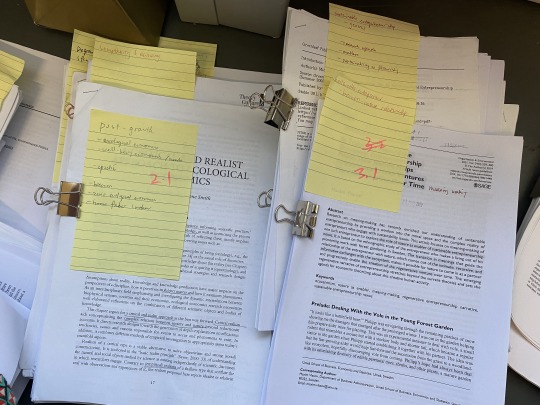
I find writing a few points that touches me (not necessarily the authors' most important arguments) on the top of the cover page of the paper works for me. If time allows I may put them into Roam Research (my notes-taking app), but it is not compulsory. But leaving multiple traces of materials encountered, including print it out, add entry in endnote, and write down authors and book/paper titles in one central place (e.g., Roam Research, not a random notebook!) are highly recommended. This would help tramendously particularly in stage 3.
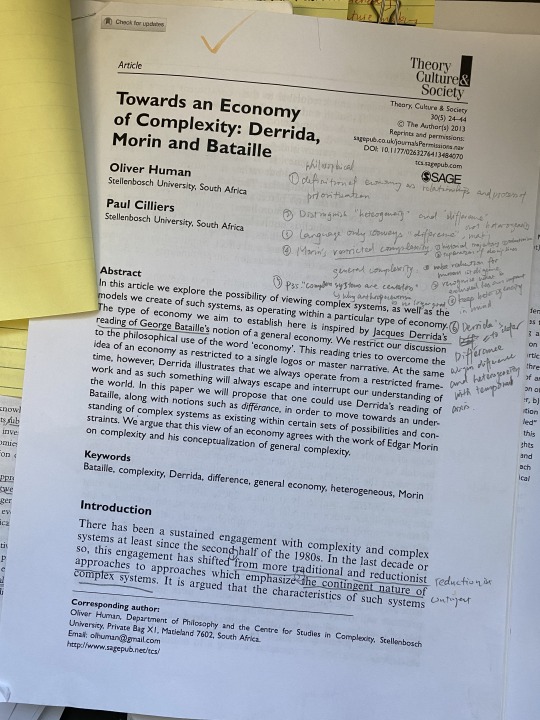
2. read to understand the fundamentals
By the end of the first stage, you should be 1) developing a sense what a field is about and how it is related or different from relevent fields 2) what are the most important theories and authors that everyone start their research with. The second type of reading is therefore to single out these authors and their most important work. For papers I suggest to read them in full length. For books deep reading at least introduction chapter and selective chapters of interest. Take good notes including important definitions, concepts and quotes. Mark clearly citation and page numbers. These reading notes will be used again and again in the future for writing conference papers / journal articles / thesis.
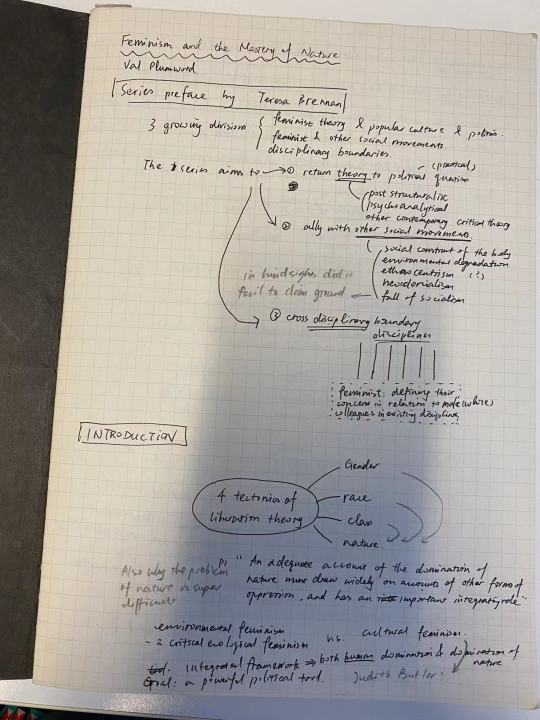
I have to admit this kind of reading is a luxury particularly given my "academic ADHD" that I described in the last post. However, I see this deep reading and engagement with important writers fundamental in forming my own thinking. Also, when presented a new theory, the first impression may be the sharpest in terms of potential conflicts with existing knowledge. This provides perfect entry for critical evaluation and development of your own thoughts. Therefore I do recommend active reading (as suggested in "how to read a book") and to write your first reactions either on the margin of the book, in a notebook or in your notes-taking system.
When it comes to this deep engagement with books/papers, notes-taking is always a struggle. On one hand, reading offline (facing book and notebook, not a screen) helps me to concentrate and think. On the other hand, offline written notes present real challenge to locate in future research. I don't have a definite answer on this yet.. Sometimes I take notes in Roam directly, other times I write notes with pen and paper (but seldomly type them into Roam). I'm also trying to take picture of my notes and upload to Roam, so that I may be able to read some of my notes when the time comes.
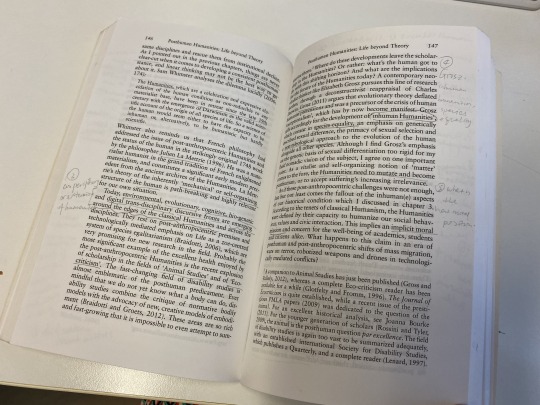
3. read to compare and write
This is the time I'm going through right now, developing my confirmation report and some other revision / paper projects. What precedents this stage is a rough structure of the thing you are writing - an outline and a few sentences to describe what you want to write for each section. These ideas are generated from the stew of type 1 and type 2 reading, and there is no linear process to reach them. But once you've got there, then you have better idea of what is the thing you are developing based on which topics or even authors you have read.
The writing / notes-taking in this stage happens directly in the work (paper or report) I developing and serves directly the objective of dedicated section. I will collect notes I've taken in the previous stages, locate the text in books/papers that is most relevant to my goal here, and write paragraphs in the paper. Note the writing here is not general introduction of theories, but really pinned down to specific views and their connections / differences.
4. read to go beyond / get new perspectives
The way academic research, particularly PhD research, is usually framed is a constant zooming in and narrowing down. But this can be dangerous sometimes. It is not uncommon in my reading hopping across different disciplines to find scholars in different fields are concerned with very similar problems with different vocabularies. Notably there are usually certain biases within a field that are not visible from within the field but only from a completely different field.
An example is that sustainable entrepreneurship is often stuck with either three intersecting circles of social, economic and environmental and a concentric model with economic in the middle circled by the social and then the environmental. But essentially both of them has an inherent dualism, viewing human and nature goals as competing, or seeing material and energy dependence the only connection between human and nature. Reading anthropology (e.g., Descola or Ingold) provides a completely different view on this.
Again this is probably against what "proper academic research" is supposed to be, but it is my belief that a lot of value could be created by these distant comparing and making sense of. So when I have some flexibility in time, I would attend speeches and seminars that seem don't have much to do with my topic, listen to non-relevant podcast and follow some of the interesting references they provide. This kind of reading is loose and free flow, without goals in mind. But I believe in the long-term they will become seeds feeding into another cycle starting from type 1 reading.
I do acknowledge that every research is different, so should be the strategies for reading. My way of learning is quite broad which may not make sense for everyone. I do think there is a big mystery in terms of how we are reading and writing and there are different patterns in different stages. You are welcome to share yours!
Photo credit
9 notes
·
View notes
Note
re: book recs on the connection between colonialism and questions of the environment - i can recommend looking into ecofeminism, there’s s plethora of scholars writing from a non-western, postcolonial perspective. val plumwood‘s Feminism and the Mastery of Nature is a good intro to the discipline, Carolyn Merchant‘s The Death of Nature goes into the topic anon asked about. Caldecott and Leland have an anthology called Reclaim the Earth which contains writings from a variety of feminist perspectives. Note that a lot of these texts are older, and that there’s a lot that has changed in the scholarship of ecofeminism (including whether that even is a useful term to use), but I do think that anon might be able to find what they’re looking for in this direction.
i actually think the death of nature is a really terrible history & wouldn't recommend it sjskfkfj can't speak to the other two. ig londa schiebinger's stuff on bioprospecting might be good here tho again, definitely not a marxist; there is also lots of lit about botany as a colonial endeavour that is useful for marxist readings but i don't know of any off the top of my head actually written from that theoretical perspective
9 notes
·
View notes
Text
Gender and Nature
Gender and nature have been intimately intertwined since the beginning of human existence. From the earliest hunter-gatherer societies to the present day, the relationship between humans and their environment has been shaped by gender norms, roles, and expectations. Yet, the complexity of this intersectionality can be understood not only through academic writing but also through a poetic tone.
Historically, patriarchal societies have viewed nature as a feminine force, passive and obedient to the dominant masculine will. This perspective has been reflected in religious myths, literature, and art. For instance, in Greek mythology, Gaia, the goddess of Earth, was often depicted as a passive, nurturing mother who existed solely to serve the male gods. This portrayal of nature as a passive and submissive force mirrors the way women have been viewed in patriarchal societies – as obedient and subservient to men.
However, this limited understanding of nature is incomplete. Nature is not a passive entity, but a dynamic force that is constantly changing and evolving. The same can be said of gender. Gender is not a fixed and immutable characteristic, but a fluid and ever-changing aspect of human identity.
The intersection of gender and nature can be understood through the lens of ecofeminism, a feminist movement that recognizes the interconnectedness of gender, race, class, and the environment. Ecofeminists argue that the exploitation and domination of women and nature are intertwined, and that both must be addressed in order to achieve social justice and ecological sustainability.
The ecofeminist perspective sees the destruction of the environment as a result of a patriarchal society that values domination, control, and exploitation. This exploitation extends not only to nature but also to women, who are often seen as inferior and disposable in patriarchal societies. This view is reflected in the ways in which women's bodies have been exploited and objectified in advertising and pornography, as well as in the ways in which women's reproductive rights have been restricted.
The ecofeminist perspective also highlights the ways in which women have been central to the preservation and conservation of nature. Indigenous women, in particular, have played a critical role in protecting their lands and communities from environmental degradation. This role has been acknowledged in the recent climate strikes led by young women, who have drawn attention to the need for urgent action on climate change.
The intersection of gender and nature is complex and multifaceted, and cannot be understood through a single lens. Rather, it requires a holistic approach that recognizes the interconnectedness of all aspects of human identity and the environment. Through this lens, we can begin to understand the importance of promoting gender equality, protecting the environment, and building sustainable and just communities for all.
7 notes
·
View notes
Text
I think we need to talk more about “Ecofeminism” both women and nature have suffered a lot due to patriarchy, pollution, male dominated societies and the exploitation of our nature. In ecofeminism in subsistence economies who produce "wealth in partnership with nature, have been experts in their own right of holistic and ecological knowledge of nature's processes" women for centuries have had more knowledge in holistic and medicinal practices involving plants and herbs, healing they daughters and those daughters learn that same knowledge from they mothers to heal their own children. Women had been called witches and crones for being simply better at medicine and caring for ill and sick, aiding women in childbirth etc.
Alternatively, ecofeminist and activist Vandana Shiva wrote that women have a special connection to the environment through their daily interactions and that this connection has been underestimated. Which is very true. In many cultures around the world from all countries in different continents women have special connection and similarities that they share with the earth(Mother Earth), childbirth, creation of life, healing etc. when it comes to exploitation of women and the earth, it’s similar yet the same. Earth is stripped of its resources for greedy purposes, and women are stripped(restricted etc)of the agency and reproductive power they have. Natural is inherently matriarchal and so is human nature because humans are apart of nature. We still have matriarchal cultures but not as many as we did before.
4 notes
·
View notes
Text
Yesterday was "Plastic Overshoot Day". This means that all plastic waste for the rest of 2023 will be mismanaged - it'll just go into the environment.
#eco terrorism#ecofeminism#environment#waste#waste management#plastic waste#sordidamok!#plastic pollution#recycling#nihilism
1 note
·
View note